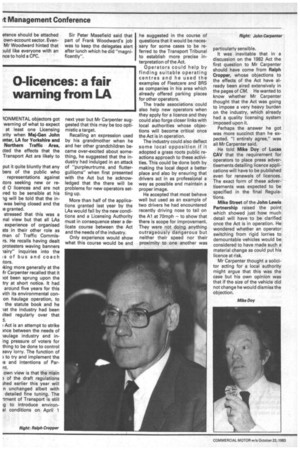0-licences: a fair warning from LA
Page 34

If you've noticed an error in this article please click here to report it so we can fix it.
30NMENTAL objectors got warning of what to expect at least one Licensing irity when Maj-Gen John niter, LA for Yorkshire and Northern Traffic Area, cted the effects that the Transport Act are likely to put it quite bluntly that any bers of the public who representations against itors seeking new or re
d 0 licences and are not ired to be sensible at his ig will be told that the inwas being closed and the ie granted.
stressed that this was a nal view but that all LAs experience of organised sts in their other role as man of Traffic Commisrs. He recalls having dealt protesters waving banners iairy" inquiries into the is of bus and coach tors.
king iking more generally at the rlr Carpenter recalled that it lot been sprung upon the try at short notice. It had around five years for this vith its environmental conon haulage operation, to the statute book and he let the industry had been ilted regularly over that
Act is an attempt to strike ince between the needs of iaulage industry and ining pressure of voters for thing to be done to control eavy lorry. The function of 3 to try and implement the is and intentions of Parnt.
own view is that the main
e of the draft regulations ;lied earlier this year will n unchanged albeit with detailed fine tuning. The -tment of Transport is still g to introduce environal conditions on April 1
next year but Mr Carpenter suggested that this may be too optimistic a target.
Recalling an expression used by his grandmother when he and her other grandchildren became over-excited about something, he suggested that the industry had indulged in an attack of "purpleurtrums. and fluttergullioms" when first presented with the Act but he acknowledged that the there will be problems for new operators setting up.
More than half of the applications granted last year by the LAs would fail by the new conditions and a Licensing Authority must in consequence steer a delicate course between the Act and the needs of the industry.
Only experience would show what this course would be and he suggested in the course of questions that it would be necessary for some cases to be referred to the Transport Tribunal to establish more precise interpretation of the Act.
Operators could help by finding suitable operating centres and he used the examples of Fleetcare and BRS as companies in his area which already offered parking places for other operators.
The trade associations could also help new operators when they apply for a licence and they could also forge closer links with local authorities whose objections will become critical once the Act is in operation.
The industry could also deflect some local opposition if it adopted a grass roots public reactions approach to these activities. This could be done both by making the local depot a better place and also by ensuring that drivers act in as professional a way as possible and maintain a proper image.
He accepted that most behave well but used as an example of two drivers he had encountered recently driving nose to tail on the Al at 70mph — to show that there is scope for improvement. They were not doing anything outrageously dangerous but neither their speed nor their proximity to one another was particularly sensible.
It was inevitable that in a discussion on the 1982 Act the first question to Mr Carpenter should have come from Ralph Cropper, whose objections to the effects of the Act have already been aired extensively in the pages of CM. He wanted to know whether Mr Carpenter thought that the Act was going to impose a very heavy burden on the industry, which already had a quality licensing system imposed upon it.
Perhaps the answer he got was more succinct than he expected. "I entirely agree," was all Mr Carpenter said.
He told Mike Doy of Lucas CAV that the requirement for operators to place press advertisements detailing licence applications will have to be published even for renewals of licences. The exact form of these advertisements was expected to be specified in the final Regulations.
Mike Street of the John Lewis Partnership raised the point which showed just how much detail will have to be clarified once the Act is in operation. He wondered whether an operator switching from rigid lorries to demountable vehicles would be considered to have made such a material change as could put his licence at risk.
Mr Carpenter thought a solicitor acting for a local authority might argue that this was the case but his own opinion was that if the size of the vehicle did not change he would dismiss the objection.
































































































